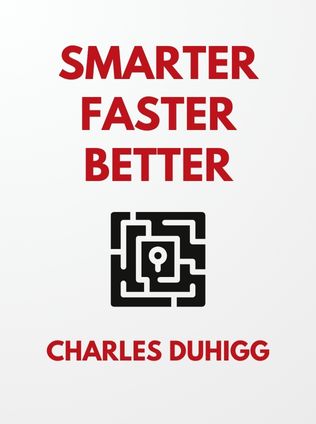
Smarter Faster Better
The Secrets of Being Productive in Life and Business
By Charles Duhigg
Published 03/2016
About the Author
Charles Duhigg is a Pulitzer Prize-winning journalist and author, renowned for his ability to delve into the science of productivity and behavior change. His first book, The Power of Habit, became a bestseller by exploring the science behind why habits exist and how they can be changed. In his follow-up book, Smarter Faster Better, Duhigg takes on the challenge of understanding what makes people and organizations more productive. His work combines insights from psychology, neuroscience, and behavioral economics, making complex ideas accessible and practical for everyday use.
Main Idea
Smarter Faster Better is based on the premise that productivity is not merely a function of working harder or longer, but rather about making smarter choices in various aspects of life. Duhigg identifies eight key principles that, when applied, can significantly enhance both personal and organizational productivity. These principles include finding motivation, maintaining focus, setting effective goals, making productive decisions, fostering innovation, using data wisely, building effective teams, and managing a productive workforce. The book provides actionable strategies grounded in scientific research to help individuals and organizations achieve more with less effort.
Table of Contents
- Introduction: The Science of Productivity
- Find Motivation
- Maintain Focus
- Set Effective Goals
- Make Productive Decisions
- Become a Productive Innovator
- Use Data Productively
- Build a Productive Team
- Manage a Productive Workforce
- Conclusion: The Future of Productivity
Introduction: The Science of Productivity
In the introduction to Smarter Faster Better, Charles Duhigg explores the foundational idea that productivity is not just about working harder but about working smarter. He posits that the key to becoming more productive lies in making the right choices about where to focus your efforts, how to think about problems, and how to structure your work and personal life. Through a combination of case studies, scientific research, and real-world examples, Duhigg introduces the eight core principles that form the backbone of the book, each aimed at unlocking new levels of efficiency and effectiveness.
"Productivity is about making certain choices in certain ways that move us from being merely busy to genuinely productive." - Charles Duhigg
Find Motivation
One of the first and most crucial principles discussed in the book is the importance of finding motivation. Duhigg emphasizes that motivation is the driving force behind productivity, and without it, even the most efficient systems and strategies will falter. He suggests that motivation can be cultivated by making small, deliberate choices that enhance your sense of control over a situation. When people feel in control, they are more likely to be motivated because they believe they can influence the outcome of their efforts.
In addition to control, Duhigg highlights the importance of linking tasks to a larger purpose. When individuals understand how their actions contribute to broader goals or values, they are more likely to stay motivated, even when faced with challenging or mundane tasks. This connection to a higher purpose turns everyday tasks into meaningful actions that drive sustained motivation.
- A student might choose to start studying for exams by organizing their notes, a small task that gives them a sense of control and reduces feelings of being overwhelmed.
- A nurse might find motivation in the daily grind of paperwork by reminding themselves that accurate records are crucial for patient care and safety.
"Motivation becomes easier when we transform a chore into a choice." - Charles Duhigg
Maintain Focus
Maintaining focus is another critical aspect of productivity that Duhigg explores in depth. He explains that distractions and cognitive traps like cognitive tunneling and reactive thinking can severely hamper productivity. Cognitive tunneling occurs when the brain becomes overly focused on a single task or stimulus, to the exclusion of other important information. Reactive thinking, meanwhile, refers to the brain’s tendency to respond automatically to stimuli, often without fully considering the context or long-term consequences.
Sign up for FREE and get access to 1,400+ books summaries.
You May Also Like
The Subtle Art of Not Giving a F*ck
A Counterintuitive Approach to Living a Good Life
By Mark MansonRich Dad Poor Dad
What the Rich Teach Their Kids About Money - That the Poor and Middle Class Do Not!
By Robert T. KiyosakiHow To Win Friends and Influence People
The All-Time Classic Manual Of People Skills
By Dale CarnegieQuiet: The Power of Introverts
The Power of Introverts in a World That Can't Stop Talking
By Susan Cain



















